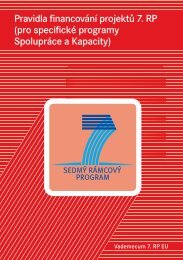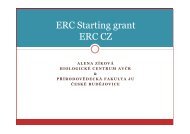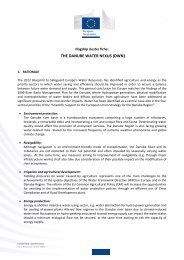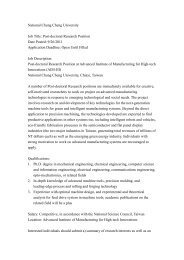Guide to Research and Innovation Strategies for Smart Specialisation
Guide to Research and Innovation Strategies for Smart Specialisation
Guide to Research and Innovation Strategies for Smart Specialisation
You also want an ePaper? Increase the reach of your titles
YUMPU automatically turns print PDFs into web optimized ePapers that Google loves.
get out of grant logic, become self-sustainable. Financial engineering <strong>to</strong>ols can offer<br />
alternatives whose potential has not been exploited well enough in the social (innovation)<br />
sec<strong>to</strong>r.<br />
But social innovation can create new business opportunities, e.g. in growth sec<strong>to</strong>rs like health<br />
<strong>and</strong> education. It can also play an important role in the modernisation <strong>and</strong> trans<strong>for</strong>mation of<br />
the public sec<strong>to</strong>r <strong>and</strong> public services, through cooperation with social enterprises, NGOs <strong>and</strong><br />
civil society <strong>and</strong> needs there<strong>for</strong>e <strong>to</strong> be exploited.<br />
How <strong>to</strong> act?<br />
Member States <strong>and</strong> the EC are investing in social innovation activities. Examples can be<br />
found in urban regeneration, community-led local development, microfinance, (e-)health <strong>and</strong><br />
ageing, workplace innovation, co-creation, service innovation <strong>and</strong> social <strong>and</strong>/or green public<br />
procurement.<br />
It is important <strong>to</strong> link business, the public sec<strong>to</strong>r, the social economy <strong>and</strong> civil society. To<br />
achieve impact regional <strong>and</strong> managing authorities must use the expertise of public<br />
organisations such as innovation agencies, social/work agencies <strong>and</strong> regional development<br />
agencies, but also NGOs, volunteering organisations, religious organisations, etc. should not<br />
be left untapped.<br />
New cooperation structures <strong>and</strong> partnerships can be set up, incubation facilities can be<br />
provided <strong>for</strong> social enterprises <strong>and</strong> citizens' initiatives as well as measures <strong>to</strong> stimulate the<br />
development <strong>and</strong> scaling up of social enterprises aiming at the creation of social value. Public<br />
sec<strong>to</strong>r is central in the delivery of many services of social <strong>and</strong> economic value. In this regard,<br />
it has a pivotal role in answering (<strong>to</strong>gether with private stakeholders <strong>and</strong> the civil society)<br />
<strong>to</strong>day's major societal challenges such as demographic ageing, increased dem<strong>and</strong> <strong>for</strong><br />
healthcare services, risk of poverty <strong>and</strong> social exclusion, the need <strong>for</strong> better <strong>and</strong> more<br />
transparent governance <strong>and</strong> a more sustainable resource management.<br />
Public sec<strong>to</strong>r innovation may involve, notably, new or improved services (e.g. healthcare at<br />
home), organisational innovation, system innovation (e.g. new patterns of co-operation <strong>and</strong><br />
interaction) <strong>and</strong> conceptual innovation (e.g. a change in the outlook of ac<strong>to</strong>rs). This can lead<br />
<strong>to</strong> increased efficiency, <strong>and</strong> delivery of new <strong>and</strong> better quality services that respond not only<br />
<strong>to</strong> the users' evolving needs <strong>and</strong> expectations but also <strong>to</strong> budget constraints.<br />
Direc<strong>to</strong>rate General (DG) Regional Policy is publishing a guide on social innovation <strong>for</strong> the<br />
EU's regions. It will contain guidance on how <strong>to</strong> design regional strategies that include social<br />
innovation as a potential <strong>for</strong> growth <strong>and</strong> change.<br />
The categories <strong>for</strong> Regiostars awards <strong>for</strong> 2013 (organised by DG Regional policy) include a<br />
category <strong>for</strong> social innovation 165 .<br />
Micro-finance has proven <strong>to</strong> be a good <strong>to</strong>ol <strong>to</strong> support social innovation enterprises. In this<br />
respect, the European Commission has launched the JASMINE scheme. JASMINE, the Joint<br />
Action <strong>to</strong> Support Micro-finance Institutions in Europe. JASMINE is a joint initiative of the<br />
Commission <strong>and</strong> the EIB group <strong>to</strong> support non-bank micro-credit providers in the EU.<br />
165 http://ec.europa.eu/regional_policy/cooperate/regions_<strong>for</strong>_economic_change/regiostars_13_en.cfm<br />
109

















